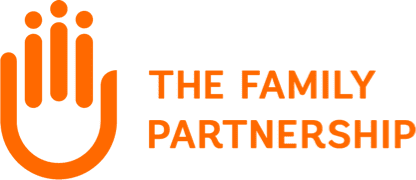For National Human Trafficking Prevention Month our PRIDE team answers a Q&A on UPSIDE, a new innovative anti-sex trafficking initiative. The Family Partnership, Breaking Free and The Link, service providers with a history of doing anti-sex trafficking work in Minneapolis, are working together to provide coordinated services to people that are being sex trafficked.
Q. How big an issue is human trafficking/sex trafficking in Minnesota?
Human trafficking is the fastest growing criminal enterprise in the U.S. and 28 million people are trafficked worldwide. In 2015, Minnesota had the third-highest number of human trafficking cases nationally, and the FBI ranked the Twin Cities as one of 13 U.S. cities with the highest incidence of sex trafficking for youth (although people of all ages are trafficked).
The Duluth harbor has been a source of trafficking since the turn of the century, while today interstates 94 and 35 are routes traffickers use to move people between Midwest cities. For more than 40 years, The Family Partnership’s PRIDE (Promoting Recovery, Independence, Dignity and Equality) program has provided support services to sexually exploited adults, youth and their families so they can live a life free of exploitation and abuse and move towards self-sufficiency.
Q. What is your approach?
The UPSIDE outreach teams meet people experiencing sexual exploitation on our streets today – especially those facing the greatest disparities in access to services (Black, Indigenous and People of Color; and, transgender/gender non-conforming individuals).
What makes UPSIDE unique is that collectively, we have the opportunity to “pair” folks up with culturally specific, safe and healing informed services that are age appropriate and gender-based. Each agency in the partnership offers an array of services that we can leverage. We help people access food, clothing or a place to stay, medical or mental health care, and provide longer-term intensive case management, participation in survivor led support groups, legal advocacy and more to provide the support systems needed for lasting change.
Q. How does this initiative differ from past efforts?
Our strategy is to offer help, resources and real options for the whole community, not just survivors but businesses and residents as well. We offer one phone number to call or text for information. The UPSIDE team offers trainings on how to identify sex trafficking and what to do if you suspect someone might be trafficked.
Through street outreach (or by request by businesses) we offer outreach kits with personal hygiene items, hand and feet warmers, snacks, water, information cards and hand sanitizer. In the winter months, we also bring hats and mittens for those who need them. The kits offer tangible resources and a bridge to conversations with those in need.
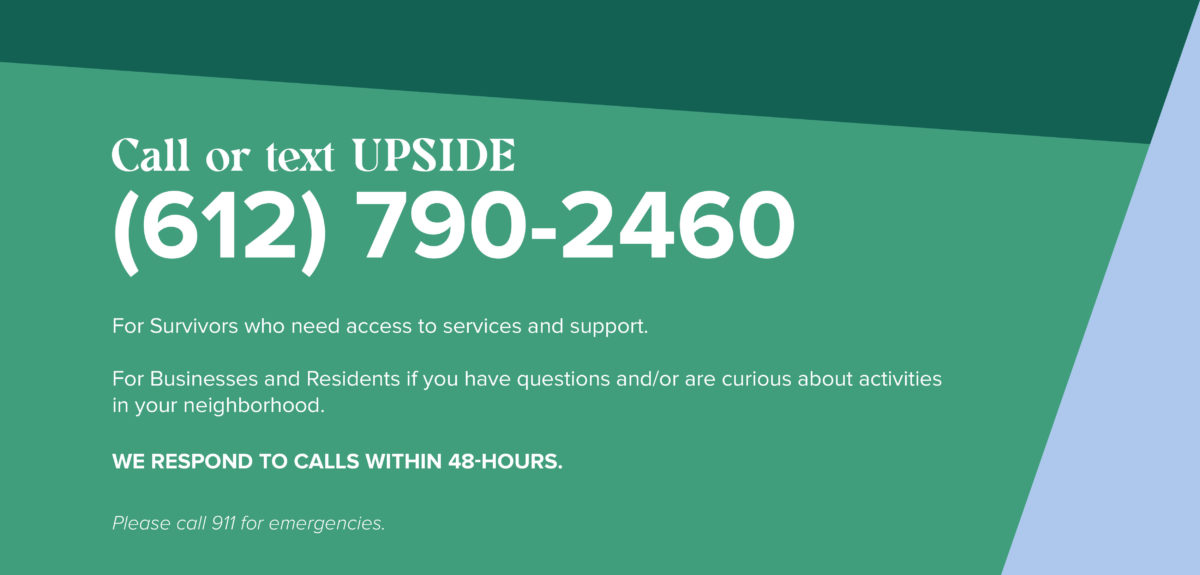
Q. How will you determine if UPSIDE is making a difference?
To track progress, UPSIDE is using a measurement tool called “The Bridges to Self-Sufficiency” which gauges progress by survivors in specific, measurable goal areas. A goal may start small such as talking with a case manager or attending drug counseling or support group meetings. This leads to bigger goals like finding stable housing, gaining education or getting a new job.
We also track the number of people we interact with on the streets. We know it takes multiple contacts with those in “the life” to build trust. In short, we walk alongside victims, as they become survivors.
Q. What gives you hope for change with UPSIDE?
We see positive changes every day. We believe that connections and relationships are powerful forces for change. Street outreach is a tool we use to bring people to UPSIDE, but the real change begins when they are connected with a case manager or advocate. By demonstrating grace and respect to everyone we interact with, UPSIDE is empowering people with sustainable solutions that stand up against some of the darkness in our community.
UPSIDE is funded by the City of Minneapolis through the American Rescue Plan Act.
The Family Partnership is expanding pilots across Minnesota of its Virtual Home Visiting Executive Functioning Across Generations™ curriculum. Through a partnership with the Minnesota Coalition for Family Home Visiting and the Medica Foundation, The Family Partnership seeks geographic and cultural diversity in the family pilot participants from northern, central and southern Minnesota programs.
Three sites selected, applications remain open!
Three sites are conducting new pilots of The Family Partnership’s parenting component of the executive functioning curriculum in Minnesota. Family Home Visiting pilots are beginning in Stearns County and the Healthy Families America® programs with Headway and The Family Partnership in Minneapolis. Each pilot site will recruit 10 households with at least one parent and a child 3-5 years of age in the household. The curriculum is designed for delivery in 10 sessions over 20 weeks.
Who is eligible? Any Home Visiting program in Minnesota, serving families with children ages 3-5 is eligible to apply for this pilot program—full details are in the application materials here.
Application deadline extended until participants are selected! Applications should be emailed to: John Everett Till, VP of Strategy and Innovation, The Family Partnership at jtill@thefamilypartnership.org. Call 612-728-2086 with any questions.
Programs will receive training in brain-science concepts and coaching during the implementation process, implementation funding and ongoing access to the Virtual Adaptation of the Executive Functioning Across Generations™ curriculum materials. Full details in the application materials.
Brain-Science Curriculum Builds Core Life Skills
The Family Partnership’s intervention counteracts the negative impact of adverse childhood experiences (ACEs) and trauma faced by many young children and families, especially those living in poverty. The 2Gen Executive Functioning Across Generations© curriculum, is the first designed to boost children’s and their caregiver’s executive functioning and self-regulation skills – the essential skills needed to stay on track with goals, imagine consequences of actions, inhibit impulsive behavior and succeed in school and life.
Award-winning, Nationally Piloted Curriculum
The Minnesota Council on Nonprofits (MCN) recognized The Family Partnership as the winner of its 2021 Nonprofit Mission Award for Innovation for the Executive Functioning Across Generations™ model.
The Family Partnership’s original curriculum for preschool classrooms, piloted in 2017-2019, led to national pilots in four states. The curriculum was adapted for home visiting and parenting group pilots supported by The Harvard Center on the Developing Child Frontiers of Innovation (FOI).
Dr. Chris Wing developed the language-based curriculum that first establishes “Internal State Words” for thoughts, feelings, sensory perceptions, physical sensations and moral concepts. As children learn, they can use these words to identify and express themselves and develop personal narratives about their experiences. As parents’ skills related to executive function and self-regulation increase, they are able to model use of these language skills with their children. The parents also increase their ability to recognize and respond to their children and provide supportive relationships.
Read more about how Brain-Science informs our work here.
The Family Partnership was one of ten programs nationally selected for the highly competitive Promising Ventures Fellowship supporting social entrepreneurs in the early childhood field. Our Executive Functioning Across Generations® innovation that builds school readiness, buffering kids against toxic stress while building brainpower, was selected for the Early Innovations track.
Dianne Haulcy, President & CEO and John Everett Till, Sr. Vice President of Strategy and Innovation will participate in the fellowship for six months (October 2022-March 2023) gaining access to innovators and experts in both early childhood and social enterprises. The fellowship includes dedicated coaches and specialized training resources with sponsorship from the Overdeck Foundation.
“This fellowship provides the opportunity for us to accelerate taking our curriculum to scale nationally. Boosting children’s executive functioning brain skills is proven to stick with them over time, advancing both learning and lifelong success.”
Dianne Haulcy
Promising Ventures selection criteria included ventures that centered equity along with having the potential to drive social impact at scale. The Family Partnership’s executive functioning curriculum was centered from the beginning on the children and families of color that The Family Partnership serves building-in a strong focus on addressing equity in communities seeking resources to break intergenerational cycles of poverty, adversity, and trauma.
Promise Ventures Studio invited The Family Partnership to participate in a national exploration of school readiness ventures hosted by the Gates Foundation in October. The new international initiative called Measures for Early Success brings early childhood innovators together so they can pool their talents to identify equity-centered measures of school readiness that do not “fade out” when children enter kindergarten.
Learn more about Executive Functioning Across Generations©
Dianne Haulcy rejoined The Family Partnership as President and CEO in mid-July. We asked her to share her thoughts on the organization’s mission and her career.
What can you tell us about being back at The Family Partnership?
“It has been a whirlwind! However, it is good to be back and, it feels as if this is where I am supposed to be. I love the direct service work that The Family Partnership does, and that we are located in both north and south Minneapolis. We have all been through a lot over the last couple of years and we can play a role to help bring healing to the community.”
You are well known as an early childhood education leader, what path led you to focus on early childhood education in your non-profit career?
“Early in my career, I worked with youth in the low-income housing projects in Minneapolis (that no longer exist). I quickly realized these 13-15 year-old teenager’s vision of the future was already set. The girls talked about having babies and the boys discussed not if they would go to jail, but what year they would be going to jail.
These brilliant young people’s circumstances had deeply impacted their future. That grew into a real knowledge around the power of early childhood development to change the trajectory of children’s futures, especially those without financial resources to get high quality care.”
Increasing preschool enrollment is one of your priorities. You were able to attend our preschool graduations recently, and you looked like you were having fun!
“One of the best parts of my job is seeing families celebrate their children and see young children be proud of their accomplishments. At The Family Partnership’s two preschools, over 90% of children routinely graduate rated kindergarten-ready and our on-site screenings and developmental therapies assist in removing any barriers to learning.”
“We are not unique in the impact the pandemic had on our preschool enrollment and availability of teachers. Right now, we are hiring additional teachers and getting the word out for preschool enrollment. Everyone is working hard to restore our preschool enrollment.”
“We have all been through a lot over the last couple of years. How can we help bring healing to the community?”
Dianne Haulcy
What are longer-term priorities?
“We have a brand new building at Lake Street and Bloomington Ave. that opened in the middle of the pandemic. Now we have an opportunity for more use of our facility as a space for community building. I want us to have our eyes and ears open and listen to the community so we can see the trends and ways we can bring healing. Relationship building is very important for me.”
Anything else about your impressions of The Family Partnership?
“We have some really, really committed staff people here that love the work they are doing, serving the families that they serve. Their passion is the foundation that drives what we do. The idea of listening to the community is not a new one, it’s how The Family Partnership has continued to evolve and morph for over 140 years as the community has grown and changed. We will continue to do that!”
Learn more about Dianne Haulcy
Learn more about our preschools
Learn more about current job opportunities
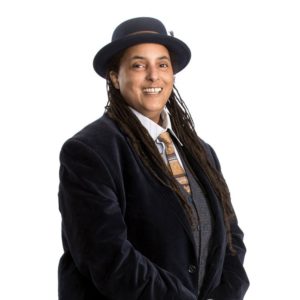
In the U.S. and around the world, the LGBTQ+ community celebrates Pride Month in June. We asked LGBTQ+ Trans BIPOC advocate Roxanne Anderson to share their story and talk about Pride.
Pride honors the 1969 uprising when patrons and supporters of the Stonewall Inn in New York City resisted police harassment and persecution, marking the beginning of a more public movement to end discriminatory laws and practices against LGBTQ+ Americans.
What is the legacy and impact of Pride Month for social change?
Millions of people celebrate Pride globally. Here in Minnesota about 450,000 people attend the Twin Cities Pride celebration (in its 50th year!) There is also MN POC Pride and there are pride celebrations in Duluth, Golden Valley, Pine City, Rochester, and many more cities and towns across the state. That is power!
The power and visibility of the Trans (transgender) community literally fueled this whole celebration we call Pride. Remember that the Stonewall riots were led by Trans women of color. (African-American Marsha P. Johnson and Latina-American Sylvia Rivera). I remember the impact of Rivera standing on stage in 1973 and calling out the larger queer community with “Y’all better quiet down”. She talked about the real discrimination, surveillance and violence she experienced.
You currently serve as Director of the Minnesota Transgender Health Coalition, and a mission of yours is creating SAFE SPACES for the LGBTQ+ community.
Since 1996, I have dedicated a great deal of time and energy to creating safer places for LGBTQ+, BIPOC communities. One of those places is RARE Productions and one of the events we produce is the Power to the People area at Twin Cities Pride, a space and stage by and for Queer BIPOC folx. It started from discrimination against a black Trans woman not getting her stage time. This year marks the 20th anniversary for us being in (Loring) park. Visibility is vital.
Talk about challenges facing the Trans community in Minnesota
The greatest challenges facing the Trans community—all communities really—are transphobia, racism and white supremacy and all the ways it impacts economics, education, housing, and employment. White supremacy leeches into and supports transphobia, ableism, and misogyny.
“When I speak about racism and white supremacy being the greatest challenges facing the Trans community, I do so with the profound understanding that white folx can love people of color and have no real understanding of what white supremacy in all its forms is or does.”
Roxanne Anderson
Can you share your back-story growing up?
I am a black presenting, mixed race, trans-racially adopted, gender non-conforming person, raised in a white home. A very WASPie white home. I grew up in a traditional family. Both my parents were preachers’ kids and worked. Our active lives with family and friends included piano, dance, girl scouts, tending our massive gardens, as well as church activities like choir, bells and youth group.
In my younger years, we lived in a city that had some diversity, in that people of color went to my school, attended our church and our family had relationships with people of color not only from our immediate environment but also in extended family/community relationships. When I was in high school, we moved to an all-white rural community. With this life history, I have the unique experience living and being with white people who really do love me, and sometimes have no understanding of the impacts racism has had on my life.
So when I speak about racism and white supremacy being the greatest challenges facing the trans community, I do so with the profound understanding that white folx can love people of color and have no real understanding of what white supremacy in all its forms is or does.
How important are Trans-specific mental health services and what are barriers to care?
Mental health care is vitally important to help counter the isolation and address the trauma of transphobia and violence. These services should support transgender folx not only during transition, but to help them transform to their most authentic, higher selves.
There are many barriers to Trans folx receiving or even seeking the support – from finances, time, a lack of insurance or stigma and not feeling worthy of care. There is a lack of culturally competent providers that have a real connection to Trans lives. Sometimes people are just so overwhelmed by pure survival they can’t even think about mental health support.
What drives you to do this advocacy work for the LGBTQ+ community?
I do this work of gay for pay or professional queer because it is my path and purpose – my legacy if you will – to make true and authentic connections, build relationships and create safer space for trans and queer BIPOC folx.
We matter, black Trans lives matter, and we have always led across social justice movements.
Roxanne Anderson is an activist, artist, entrepreneur and organizer working at the intersections of Race, Gender and Sexuality to dismantle systems of oppression.
FAQ on The Family Partnership Transgender Mental Health Services
The Family Partnership welcomes back Dianne Haulcy as the agency’s next President and CEO beginning July 11. She will succeed Molly Greenman, who is retiring June 30 after 35 years, including 18 as President and CEO.
A Minnesota native, Haulcy has 25 years of non-profit executive experience, most recently as Senior Vice President of Family Engagement at Think Small. At The Family Partnership, she will oversee a $10 million organization with 100 staff dedicated to removing barriers for families impacted by low-income, systemic racism and adversity to clear the path to greater well-being.
Returning to The Family Partnership
This is a homecoming for Haulcy, who played a crucial role in ensuring The Family Partnership’s program expansion and funding stability. She served as Executive Director of Reuben Lindh Family Services from 2006 until its merger with The Family Partnership in 2011. Haulcy then agreed to assume the Chief Operating Officer position from 2011-2014 to help lead the post-merger consolidation.
“I am so excited to be returning to The Family Partnership, it feels like coming home. My passion is working to create opportunities for families and children in Minneapolis and beyond.”
Dianne Haulcy
Tommy Hillman, Board Chair of The Family Partnership, previously served on Reuben Lindh’s board of directors. “Dianne is a well-known advocate and leader with the experience and community connections to foster deep partnerships with critical stakeholders of our organization,” said Hillman. “I have personally witnessed Dianne’s passion and deep commitment to serving our community, so I have the utmost confidence that she is the right leader to move us forward.”
Advocate for Early Childhood Education and Community Leader
Over her career, Haulcy has directed five early childhood programs all serving inner city, low-income, diverse populations. At Think Small, she directed $44 million in early childhood learning scholarship dollars from the state of Minnesota, Hennepin County and the Northside Achievement Zone (NAZ) to low-income families to access high quality early learning.
As Chair of the Voices and Choices for Children Coalition, Haulcy was instrumental in passing a 2019 law that created the Community Solutions for Healthy Child Development grant program at the Minnesota Department of Health. These grants fund programs throughout Minnesota so communities of color can improve child development outcomes. The Voices and Choices for Children Coalition steering committee is comprised of professionals of color and American Indian’s advocating on behalf of children and families of color in Minnesota.
The Minnesota Public Radio (MPR) Little Moments Count Early Risers podcast Haulcy created and hosts discusses how to talk to young children about race and racism. In two seasons the 14 episode series has attracted 40,000 downloads. Following the killing of George Floyd, Haulcy wrote a blog post as a wakeup call for educators – this podcast provides tools for raising a new generation with racial equity.
As a Senior Policy Aide for former Minneapolis Mayor Betsy Hodges, Haulcy established the nationally recognized Cradle to K Cabinet, focused on children prenatal to three years-old to ensure kindergarten-readiness.
At Reuben Lindh Family Services, Haulcy revamped the agency’s strategy and structure and improved services, including increasing early childhood education from half to full-days. The North Minneapolis and Four Directions preschools, in-home parenting services and developmental therapies The Family Partnership operates today are legacy Reuben Lindh programs.
Haulcy has held many volunteer leadership positions. She currently serves as Board Chair of NAZ, on the Governor’s Early Learning Council, and is a member of the Parent Aware Advisory Committee.
She holds a bachelor’s degree in sociology from Spelman College and a master’s degree in public affairs from the Humphrey Institute at the University of Minnesota. She lives with her husband Braxton, and two teen boys in Golden Valley, Minn.
Sustainable Design Reduces Environmental Impact
The Family Partnership intentionally located its new $22 million resource center at E. Lake Street and Bloomington Ave. to invest in sustainability of the neighborhood and build health and well-being for families. In turn, BWBR’s architects used green design features to reduce energy, water and natural resources use in order to sustain the environment and reduce operating costs for the organization.
Project manager NTH, Inc. and builder Mortenson Construction were key partners in ensuring green processes came to life in the completion of the resource center in June of 2021.
Renewable Energy – Solar Panels
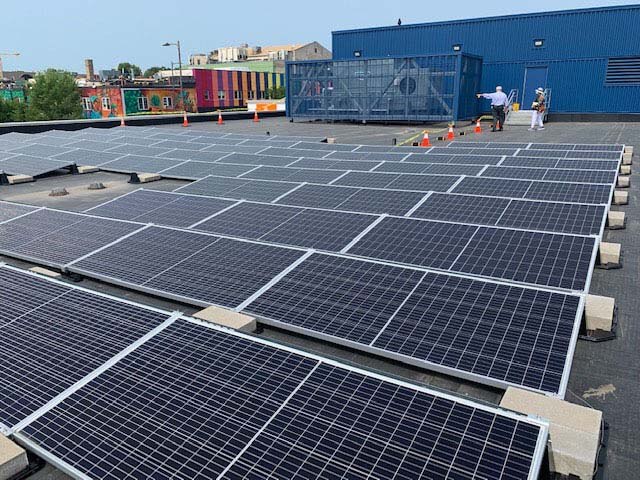
Solar panels of 50 kilowatts across two rooftops produce 60,000-kilowatt hours of energy every year. This reduces carbon dioxide by 2.5 million pounds or 57,000 trees, according to Ahmad Kian, CEO of Apadana Solar Technologies.
The solar panels will reduce The Family Partnership’s operating costs by thousands of dollars a year. The solar installation was possible by grants from the City of Minneapolis Green Cost-Share Program, Xcel Energy and donors Bruce and Julie Steiner.
Energy Efficiency
Lighting
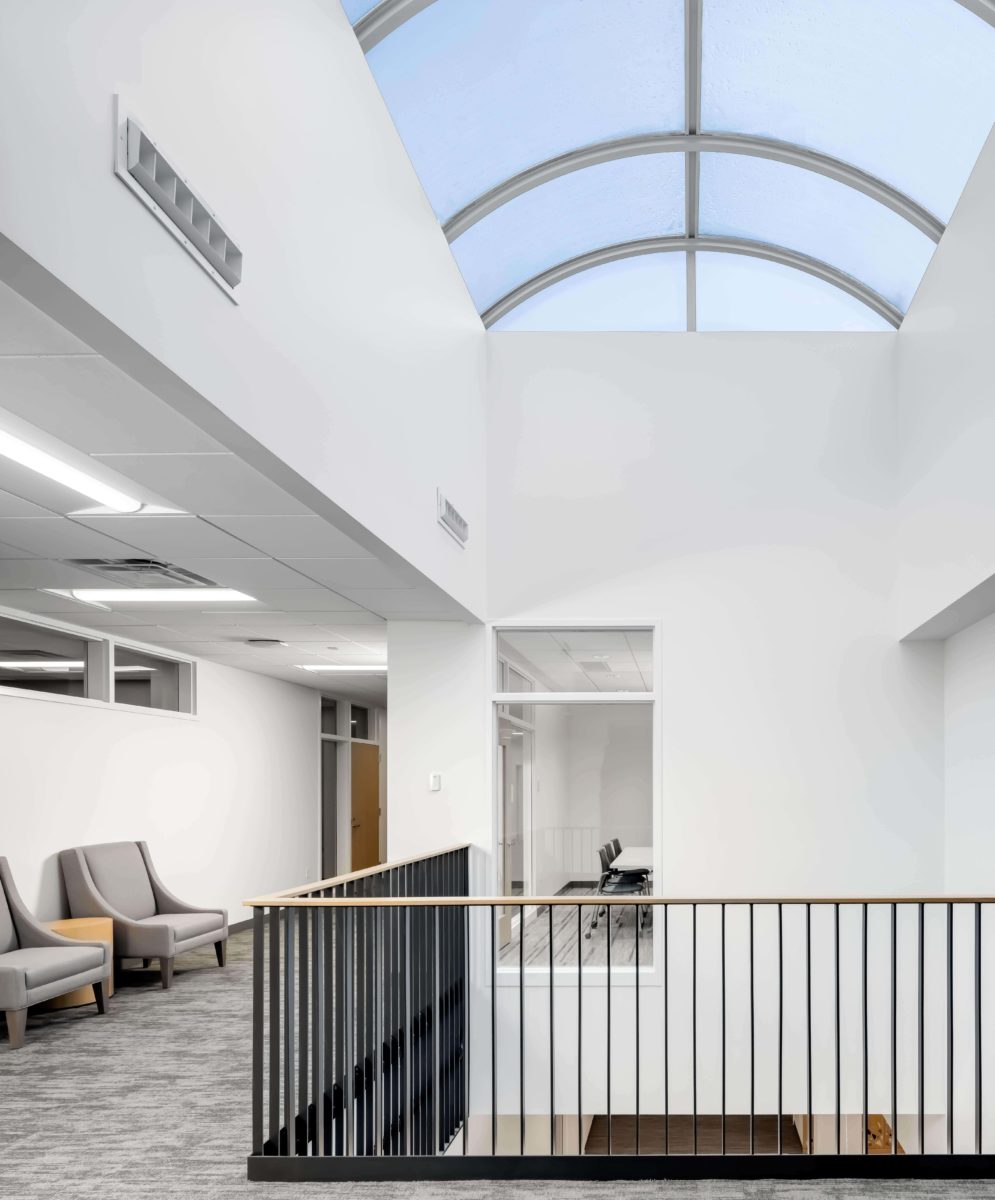
There is an abundance of natural light with a large central skylight, tall windows, and ample placement of windows throughout the building. Occupancy sensors and controlled dimmers increase the energy efficient use of LED lighting.
A portion of the electrical outlets are controlled by occupancy sensors, which eliminates “phantom” energy use, and all appliances are Energy Star compliant reducing costs of operation and saving energy.
HVAC

The gas boiler and water heater are 95% efficient. Rather than typical rooftop units, 65 heat pumps are located throughout the building creating greater efficiency, according to Sydney Wittmier, Senior Project Manager for Mortenson Construction. This heat recovery system captures and reuses heat from the heating, ventilation and air conditioning (HVAC) system exhaust, enhancing overall efficiency.
Environmental Impact
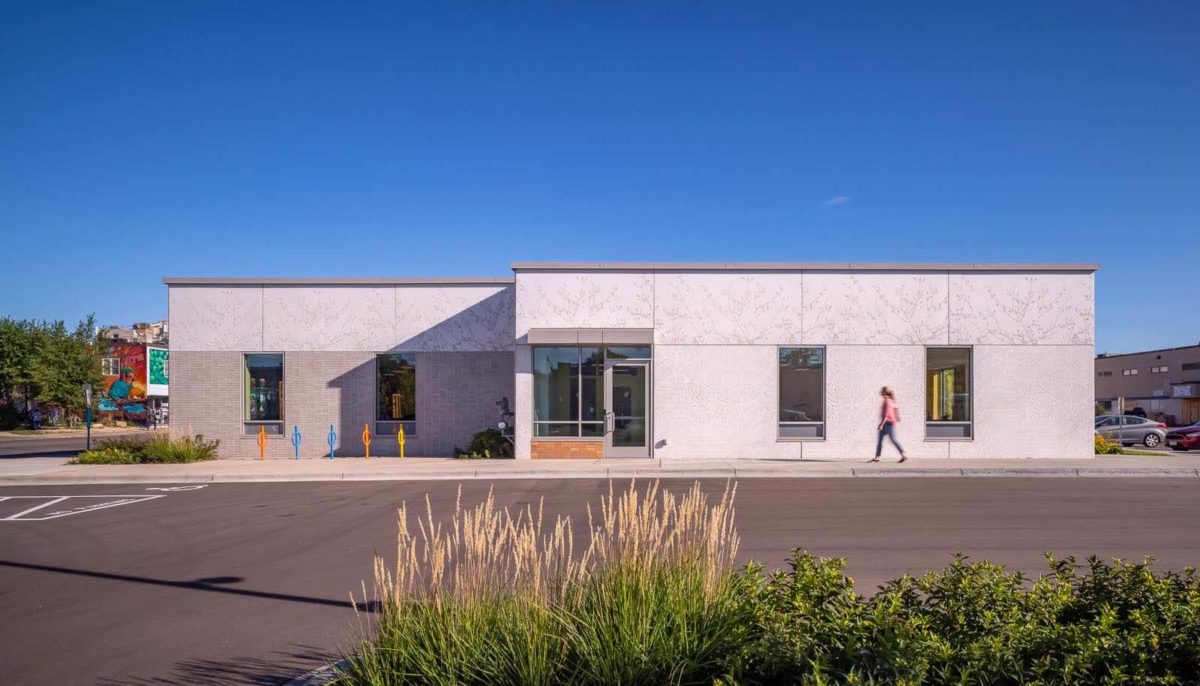
- A 190,000 gallon cistern captures and cleans rainwater and makes sure the city’s storm system isn’t overflowing (located under parking lot)
- Ample bike racks and shower facilities promote carbon free transportation
- Site is located adjacent to high frequency mass transportation
- Landscaping/plant materials require less water
- The building is considered “bird safe” – using a glass film that reduces reflectivity and avoids large expanses of glass
- Low VOC emitting construction and furniture materials were chosen
- The site is co-developed with Project for Pride in Living and will share parking and entrance drive areas reducing the manufacture of those materials
- Construction waste was sorted and recycled
For more information on the Building for Better Futures resource center, schedule a tour.
Ashley Hemnarine is joining the advancement team as Development Manager. In this role, she will be responsible for leading annual fundraising efforts and managing stewardship of donor relations.
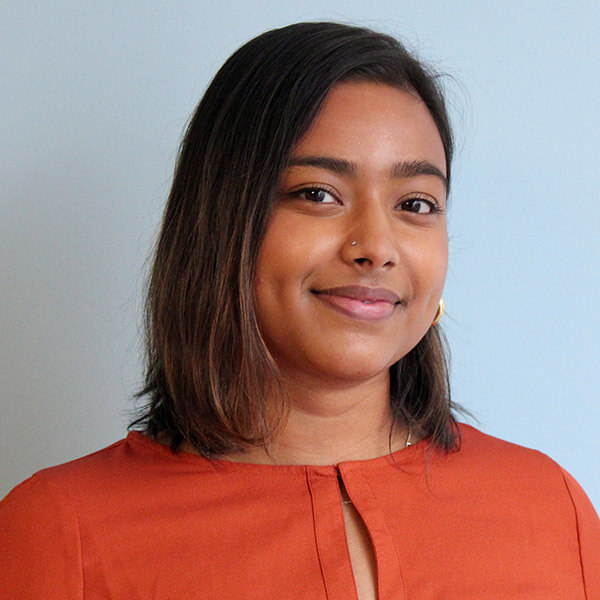
Previously, Hemnarine served as Development Associate for Touch Foundation, a nonprofit dedicated to strengthening health systems in sub-Saharan Africa. She developed and executed annual individual fundraising plans, raising over $2.3 million in the last two years. Hemnarine also served as a Senior Development Analyst for Touch Foundation and worked in fundraising for the Hackensack University Medical Center Foundation.
“Ashley brings extensive experience in the details of event and donor management and experience working directly with major gift donors,” said Kit Briem Vice President of Advancement, The Family Partnership. “When the pandemic resulted in staff turnover at her previous role, she stepped up and excelled. We are fortunate to have Ashley joining the team.”
A native of Newark, N.J., Hemnarine received her bachelor’s degree in psychology and masters of health administration from Rutgers University.
Learn more by visiting our Leadership and Ways to Give pages.
The Family Partnership’s two preschools have openings for enrollment in our early childhood programs. We asked Cassaundra Davis, Director of our North Minneapolis preschool, to share how The Family Partnership’s early education and care services are unique and what parents need to know.
Tell us about The Family Partnership’s preschools.
When our kids graduate from preschool, more than 90% test kindergarten-ready. We have two locations, one at my school in north Minneapolis, close to Theodore Wirth Parkway, and one in south Minneapolis at east Lake Street and Bloomington Avenue. We are open Monday through Friday year-round and we educate children from ages six weeks until they are eligible to enter kindergarten.
What is unique about The Family Partnership’s preschools?
We offer small class sizes and we do that intentionally to make sure that we are giving every child the attention they deserve. The Family Partnership also uses what is called a 2Gen (two-generation) approach so we not only serve the child that’s enrolled in our program – we also get to know and serve the entire family.
What developmental services do you offer?
We offer all children enrolled in our program a developmental screening within the first 30 days, so we can remove any barriers to learning. Our therapy services are all offered on-site and include occupational, physical, speech and play therapy. We also offer all children dental, vision and hearing screens throughout the year. We just want to make sure to provide children the eyeglasses, dental work or extra boost they may need to be ready for kindergarten.
“We invite your family to become part of our family. We are dedicated to every child’s success and offer resources to the entire family.”
Cassaundra Davis, Director North Minneapolis preschool
Tell us a little about yourself and your role at The Family Partnership.
I love working with kids! I have been a teacher in early childhood education for a little over 10 years and I’ve led the North Minneapolis preschool for over four years. We have a wide variety of experienced teachers who treat your children as if they are members of our own family.
How do parents enroll their children?
For north Minneapolis, they can call me, Cassandra, at (612) 294-2659.
For south Minneapolis (Four Directions), call Mary Rainey at 612-722-0766.
For more information on our Early Education and Care programs, click here.
